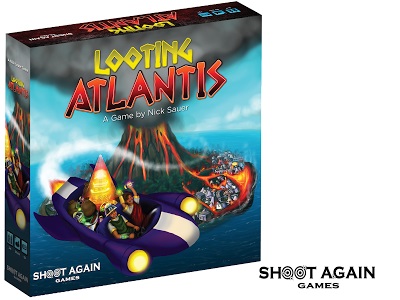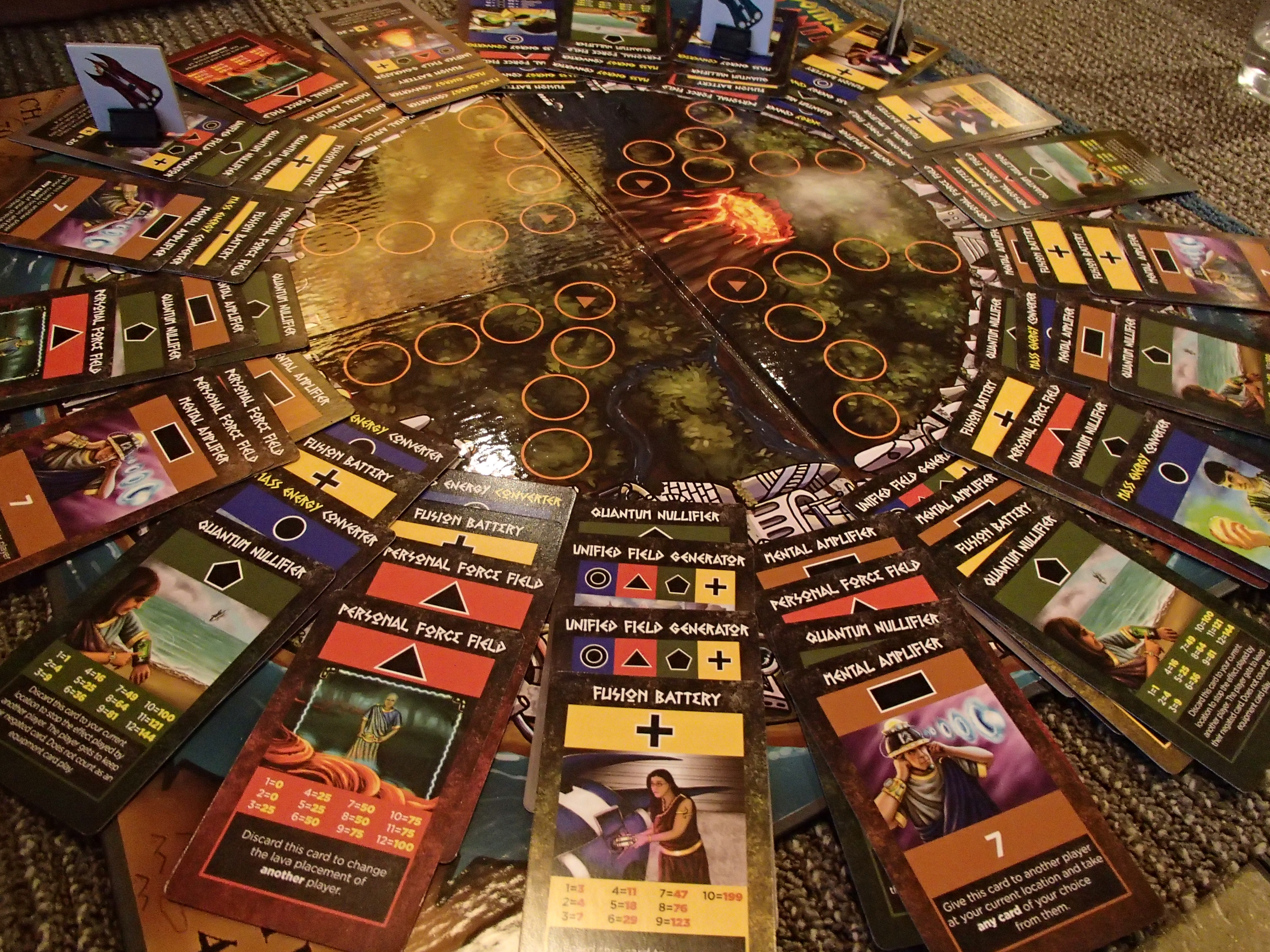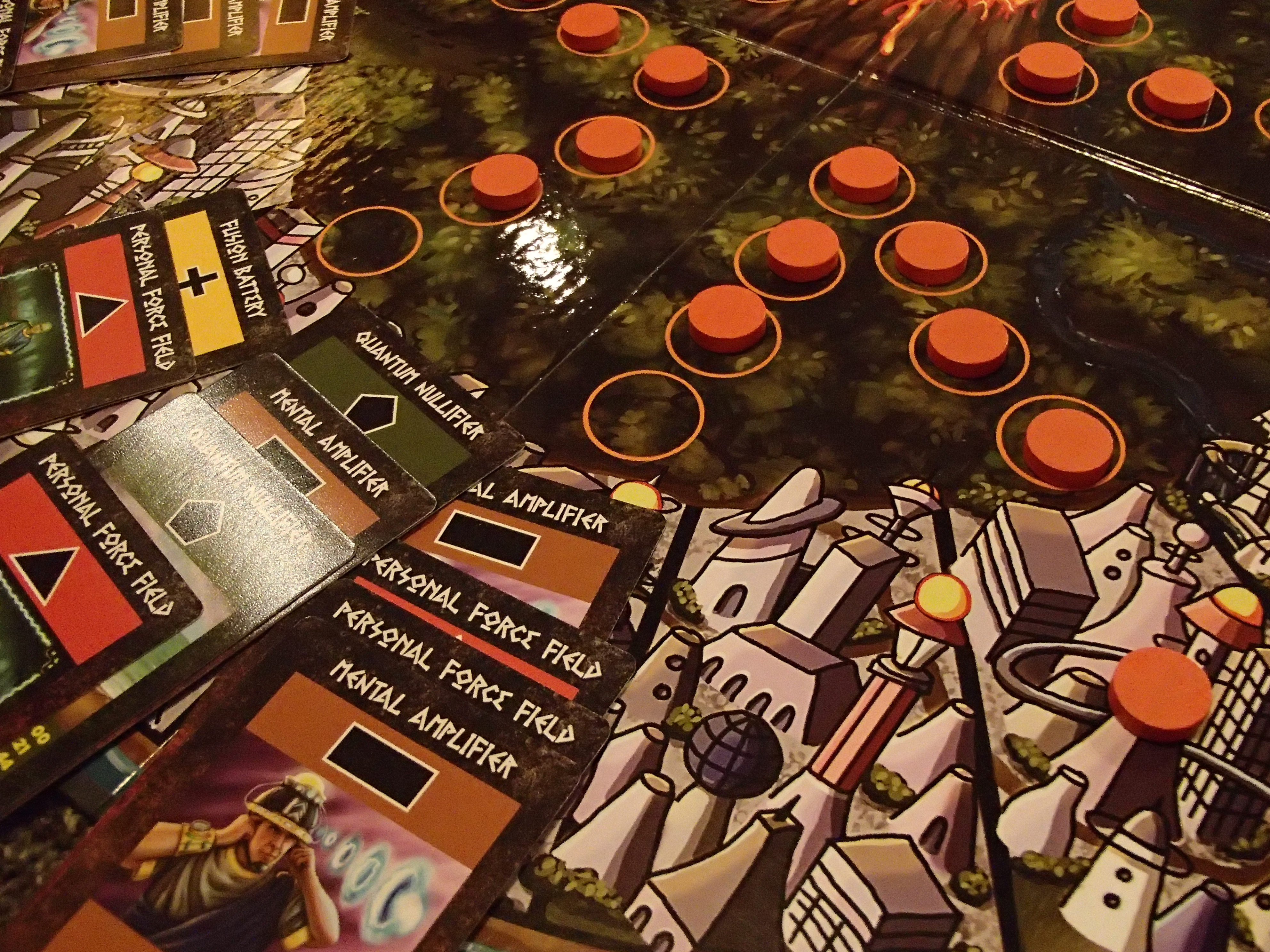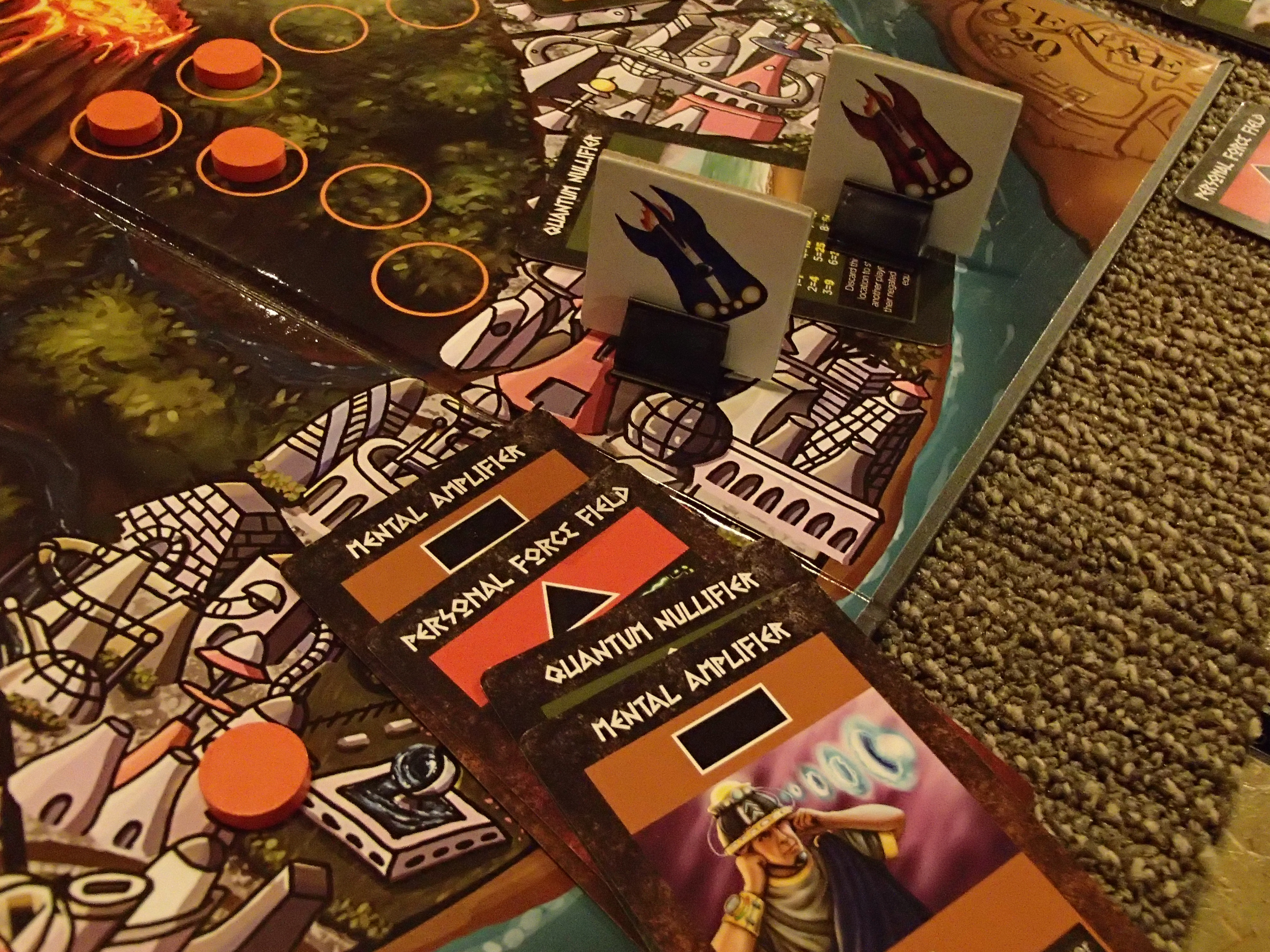| Publisher | Shoot Again Games |
| Design Credits | Nick Sauer |
| Illustration, Graphics Credits | Jenifer Williams, Matthias Bonnici |
| Game Contents | Game board, 48 wooden lava counters, 80 cards, four aircar tiles with standup bases, rulebook |
| Guidelines | Cutthroat set collection on the dying continent of Atlantis |
| MSRP | $40 |
| Reviewer | Andy Vetromile |
Atlantis. The name conjures up images of an advanced people who excelled at everything but control of plate tectonics. It also recalls memories of the really long waterslide at their resorts and hotels, but Shoot Again Games focuses on the legendary version of the island nation in their new Looting Atlantis game.
The object is to have the most points when Atlantis finally succumbs to its watery mythological fate.
Two to four advanced Atlanteans, unlike the rest of their people, have taken a more pragmatic view of their homeland’s swansong. If they have to move in with the backwards bumpkins on the continent next door they intend to bring along a few “keepsakes” to make life worth living. (You can’t count on those pyramid-obsessed peons in Egypt to have a Quantum Nullifier, after all.) With the area cleared out players hop in their air cars and ply the ash-ridden sky from one position to another on the board.
Twenty locations ring Atlantis, with four cards stacked and staggered faceup on each. Hovering over them like the Flows of Damocles are lava streams intent upon turning the continent into the fabled lost continent. A player has to advance one stream of destruction at the start of his turn by placing a lava token on one of these paths, and then he gets to take actions. He may move and/or stea . . . procure . . . cards from his current location, but though he can see all of them he must take the topmost. Cards represent the high-tech bonanza littering the shores of Atlantis and these provide points for the end of the game or special abilities during the thick of the action. You can employ additional actions, cancel rivals’ plays, and more, but this usually means losing the card – and its points – to the bottom of the “deck” on your space; it can be retrieved only if someone’s willing to dig for it.
Molten rock soon pours over the outer ring, destroying one location after another (and the accompanying goodies, never again to be seen unless someone proves Leonard Nimoy and Edgar Cayce right). If one gets doused in lava he must spend a turn getting back into the (ahem) flow of things. Eventually even this crafty race runs out of Plan Bs and they abandon the landmass for one of the adjacent civilizations. Those who back out early get first pick of the new homelands (Egypt, China, or Mycenae), and then it’s time to count up points. There are only a few card colors/types but they provide additional victory points as sets. More cards of a certain type or combination earn special bonuses, and whoever has the highest total establishes the comfiest retirement among his savage neighbors while dodging the efforts of archaeologists to track him down for their History Channel special.
The rulebook doesn’t spell Atlantean(-ian) consistently but it’s still pretty comprehensive: As short as it is, it manages to cover most questions. It tells you which cards can be played on another player’s turn, but it would be nice to have that on the cards as well (the language on those is a bit open to interpretation). Having each card type list how many copies are in the deck would also have been a boon – they’re all face-up and countable, but at-a-glance info is better, a shortcut to recounting them every time ownership shifts. Deciding from whom to steal would be so much easier . . .
Sometimes the stylized art works for it, other times it’s a little amateurish. The map of Atlantis is cartoonish but with a pleasing 1950s sort of “world of the future” flavor to it. The cards, though, while not badly done, run hot and cold with their painted illustrations. (The woman on the Fusion Battery card looks computer-generated.) Looting Atlantis has a tongue-in-cheek feel in places, so some of the Jim Holloway/Paranoia-like look it uses feels right at home. The board is big and colorful but having four cards splayed across each space means there’s a lot of fumbling and slipping and restacking cards as they get picked up and tucked under. The plastic insert in the box is just the right size for all the stuff it holds (no need to plug and unplug the air cars from their plastic bases, saving wear and tear), but a thumbhole in the cards’ nook would have made scooping them out smoother.
Moving away from the graphic execution, this game gets the job done. Looting Atlantis lives up to its timetable, taking only about half an hour to play, but it possesses a surprising depth (too soon?) in its rules. It’s tense, given how easily the cards can ebb and flow, watching one’s precious collection dwindle precariously under the onslaught of rivals only to rally and rebound the following turn or two. There are several ways to win, and for once going after other people is a viable strategy that doesn’t require sacrificing one’s own goals to cripple enemies. There’s no wasted space here; during the game one comes to appreciate the thought that went into developing it. The whys and wherefores of the design decisions come clear through play, and after the first go-round you’re left with a better idea how it all balances out (and a strong desire to applaud it).
It’s nice to have a game where canceling cards isn’t an endless chain of one-upmanship, but that doesn’t make anyone “safe.” It’s a race to the finish with an added rush as things come to a close – which happens faster than you’d think – but keep on top of those players with a tendency toward play paralysis. (“Options” still equals “length.”) It’s annoying being one of the last players since it’s almost impossible to find a spot on the board where someone can’t hit you with lava (and you can’t retire to a new landmass while recovering from lava damage), but it does allow you to pick up the last few cards you might need to complete a set (other players have to “make do” with whatever civilization they settled in for points). With balance, planning, and more forethought than the citizens here themselves had, Looting Atlantis is an expertly composed gaming experience with plenty of potential for learning, replaying, and cutthroat mastery.



